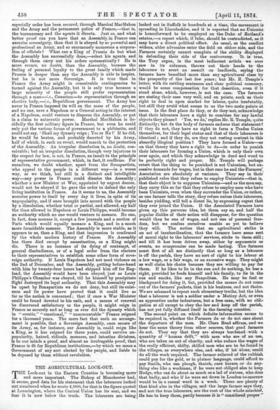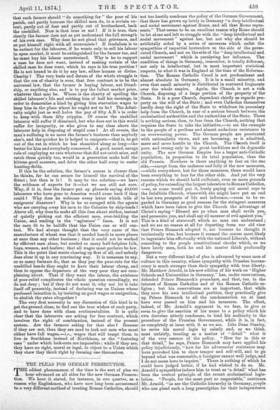THE AGRICULTURAL LOCK-OUT.
THE Lock-out in the Eastern Counties is becoming more' and more important. The Bishop of Manchester had, it seems, good data for his statement that the labourers locked out numbered when he wrote 4,000, for that is the figure quoted at Leamington, where the Central Union has its seat, and we fear it is now below the truth. The labourers are being
locked out in Suffolk in hundreds at a time, the movement is spreading in Lincolnshire, and it is reported that no Unionist is henceforward to be employed on the Duke of Rutland's estates,—a report which, if false, should be contradicted, as it may have a direct political effect. As usual, as the conflict widens, abler advocates enter the field on either side, and the Farmers certainly cannot complain of the ability displayed in defending their side of the controversy. It is true, the Tory organ, in the most indiscreet article we ever saw in its columns, throws out their heads to the labourers to avert an assault on landlords, saying the farmers have benefited more than any agricultural class by the prosperity of the last few years ; but Mr. R. Temple's letter, with its rattling sentences and clear political economy, would be some compensation for that desertion, even if it stood alone, which, however, is not the case. The farmers are stating their case very well, and on points, such as their right to deal in open market for labour, quite irrefutably, but still they avoid what seems to us the two main points at issue. In the first place do they, or do they not, acknowledge that their labourers have a right to combine for any lawful objects they please? 'Yes, we do,' replies Mr. R. Temple, quite distinctly ; but do the body of farmers endorse that statement? If they do not, they have no right to form a Trades Union themselves, for their legal status and that of their labourers is identical ; and if they do, are they not resting content in this absurdly illogical position ? They have formed a Union—as on that theory they have a right to do—in order to punish their labourers for forming a Union, which is only their own over again, and which they acknowledge in deed and word to be perfectly right and proper. Mr. Temple will perhaps retort that the thing to be punished is not Unionism, but ex- cessive demands for wages, but in that case he and the Farmers'
Association are absolutely at variance. They say in their published rules that they refuse to employ Unionists—that is, that their object is to suppress Unionism—and as the men say, they carry this so far that they refuse to employ men who have been Unionists, even when they surrender the Union, or rather, as one farmer tells the story, they refuse unless their labourers, besides yielding, will tell a direct lie, by expressing regret that they ever joined the Union. If the Associated Farmers have given up this perverse idea, let them say so, and half the popular dislike of their action will disappear, for the question would then be one of wages, and not one of personal free- dom, but we confess ourselves unable as yet to believe they will. The notion that an agricultural strike is an act of insubordination, that the farmers have some sort of moral right to the labourers' services, sticks to them still ; and till it has been driven away, either by arguments or events, no compromise can be made lasting. The farmers must first of all see distinctly that as long as a labourer is off the parish, they have no sort of right to his labour at a low wage, or a fair wage, or an excessive wage. They might as well claim his chairs because they are willing to pay for them. If he likes to lie in the sun and do nothing, he has a right, provided he feeds himself and his family, to lie in the sun and smoke, like any Neapolitan. He may be fool or blackguard for doing it, but, provided the means do not come out of the farmers' pockets, that is his business, and not theirs. We are ashamed to repeat such elementary truths, but the idea that a labourer is not a soldier under a Mutiny Act, or even an apprentice under indentures, but a free man, with no obli- gation at all except to obey the law and keep off the parish, has not yet fully diffused itself in the farming counties.
The second point on which definite information seems to be required is, whether the Farmers do or do not care about the departure of the men. Mr. Clare Read affirms, and we hear the same theory from other sources, that good farmers do not. They say that they are always burdened with a quantity of " human drift," with men who are of no use, who are taken on out of charity, and who reduce the wages of the really efficient, shifty, skilled men who are to be found in the villages, as everywhere else, and who, if let alone, could do all the work required. The farmer relieved of the rubbish could pay for the gold, or in plainer language, could afford to pay Smith, who can plough, thatch, cure horses, or do any- thing else like a workman, if he were not obliged also to keep Hodge, who can do about as much as a lad of sixteen, who does that badly, and who if he were set down in London to-morrow would he in a casual ward in a week. There are plenty of that kind also in the villages, and the large farmer says they, and not the true labourers, are the root of the whole mischief. He has to keep them, partly because it is " considered proper " that each farmer should " do something for " the poor of his parish, and partly because the skilled men do, to a certain ex- tent, partly out of fear and partly out of brotherhood, back the unskilled. Now is that true or not ? If it is true, then clearly the farmer does not as yet understand the full strength of his own case. Why does he not plead that grievance, and so put himself right with all economists ? If feudalism is to be extinct for the labourer, if he wants only to sell his labour in open market, it must be extinguished for the farmer too, and he must buy his labour unrestrained. Why is he to support a man he does not want, instead of making certain of the skilled man he does want, which he says is his true position ? He is not bound to do it by any law, either human or divine. Charity ? The very basis and datum of the whole struggle is that the era of charity is over, that free contract is to be the universal law, that the farmer is buying labour, not friend- ship, or anything else, and is to pay the fullest market price, whatever that may be. Where is the charity of spoiling the skilled labourer's life and robbing him of half his earnings, in order to demoralise a hind by giving him starvation wages to keep him in the place where he ought not to be ? The Admi- ralty might just as well halve the pay of fifty A.B.'s in order to keep with them fifty cripples. Of course the unskilled labourer will suffer if dismissed, but who does not in this world suffer for incapacity, or who gives to any class above the labourer help in disposing of stupid sons ? At all events, the man's suffering is no more the farmer's business than anybody else's, and the quicker he is helped to emigrate—that is, to get out of the rut in which he has shambled along so long—the better for him and everybody concerned. A good, sound, savage rule of employing no cats whatever that did not catch mice, and catch them quickly too, would in a generation make half the kittens good mousers, and drive the other half away to easier hunting-fields.
If this be the solution, the farmer's course is clearer than he thinks, for he can secure for himself the survival of the fittest ; but then is it ? It may be the solution—we have the evidence of experts for it—bat we are still not sure. Why, if it is, does the farmer put up placards saying 40;000 labourers who have gone to America would come back if they could ? Why does he welcome every letter which tells of emigrants' disasters ? Why is he so enraged with the agents who are carrying away his men to the Colonies by ship-loads ? Above all, why does he make all this fuss about strikes, instead of quietly picking out the efficient men, over-bidding the Union, and smiling in the " agitators'" faces. It is not the men fit to be bailiffs that the Union can or will con- trol. We had always thought that the very curse of the manufacture of wheat was that it needed hands in more places at once than any other business ; that it could not be worked by efficient men alone, but needed so many half-helpless folk, boys, women, and loafers; that all wages must perforce be low. This is the point that wants clearing up first of all, and nobody does clear it up in any convincing way. It is nonsense to say, as so many farmers do, that as they pay the poor-rate for the unskilled hands they ought to have their labour cheap, and then to oppose the departure of the very poor they are com- plaining about. That if they want the labour, the existence of poor-relief complicates the whole question exceedingly, we do not deny ; but if they do not want it, why not let it take itself off peaceably, instead of declaring war on Unions whose professed intention is, by insisting on good wages or emigration, to abolish the rates altogether ?
The very first necessity in any discussion of this kind is to get the ground clear, to find out the true wishes of each party, and to have done with sham sentimentalities. It is quite clear that the labourers are asking for free contract, which involves the right of combination, instead of the present system. Are the farmers asking for that also ? Because if they are not, then they are mad to lock out men who must
either have full wages, .e., wages that will tempt them to live in Southham instead of Northham, or the " fostering care " under which lock-outs are impossible ; while if they are, they have no right, moral or legal, to object to a Union which they show they think right by forming one themselves.



































 Previous page
Previous page